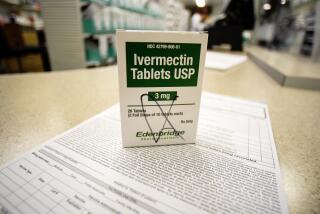TESTING DOCTORS: Spurred by reports that a...
- Share via
TESTING DOCTORS: Spurred by reports that a dentist with AIDS appeared to have infected a patient during oral surgery, federal officials are debating whether AIDS tests should be recommended for health care workers who perform invasive procedures.
Many unanswered questions remain about what is believed to be the first known instance of transmission of the AIDS virus from a health care professional to a patient. But it has prompted questions about whether hospitals and other facilities should require surgeons and other health care workers to undergo regular AIDS testing, and whether they should be permitted to practice if they are found to be infected.
Gay rights organizations and other groups, including the 600-member Physicians Assn. for AIDS Care, believe such guidelines could have a chilling impact and open the door to widespread mandatory testing. The American Medical Assn. opposes testing physicians on the grounds that patients , not surgeons, should be routinely tested.
“There are almost no documented instances of transmission from health care worker to patient; there are many more instances of transmission from patient to doctor,” said Thomas B. Stoddard, executive director of the Lambda Legal Defense and Education Fund, the nation’s largest gay rights organization.
“Therefore, if the government recommends testing or restrictions for health care workers, there will inevitably be even greater pressure for testing of patients--and the present political equation on the testing issue will be overturned.”
LONG-AWAITED REPORT: The National Institutes of Health will soon release a report on its internal investigation of prominent AIDS researcher Dr. Robert C. Gallo.
Gallo, who works at the National Cancer Institute, has been under extensive federal scrutiny. The charge is that Gallo and his NCI colleagues either knowingly or accidentally claimed as their own the AIDS virus actually discovered by Dr. Luc Montagnier of the Pasteur Institute in Paris.
The long-brewing feud between the two scientists--thought to be resolved in 1987 with a joint agreement that both would share the credit--was revived by a lengthy Chicago Tribune article last year. The story found no solid evidence of fraud but again raised questions about whether Gallo had found the virus independently in 1984, as he has claimed, whether he intentionally stole the virus from a blood sample sent to him by Montagnier when the two researchers were cooperating or whether Gallo or his co-workers had mistakenly identified the French isolate as theirs.
The reputations of both Gallo and the National Cancer Institute hinge on the outcome, not to mention millions of dollars in patent royalties from the AIDS antibody test, which are currently divided between the United States and France.
HARVARD THREATS: Harvard University has set a deadline of Nov. 1 for the United States to change immigration restrictions that prohibit most AIDS-infected individuals from entering the country. If the restrictions are not dropped by that date, the university will cancel its sponsorship of the 1992 International AIDS Conference, the world’s premier annual AIDS meeting.
Last year, the Bush Administration said it would grant temporary waivers to people attending important scientific meetings. But the National AIDS Commission, along with many public health professionals, researchers and activists, insist on the elimination of restrictions which were passed by Congress in 1987.
More to Read
Sign up for Essential California
The most important California stories and recommendations in your inbox every morning.
You may occasionally receive promotional content from the Los Angeles Times.












